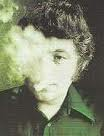"I Alone Understand What I Do": More Manchette

At the risk of boldly going where I've already gone before, let me quickly offer More Manchette. I missed J. P. Smith's review of Fatale, the latest Manchette re-issue from NYRB, and it's worth circling back for the insight it offers into Jean-Patrick Manchette the author.
On April 29th, 1977, Jean-Patrick Manchette wrote in his diary that his editors at Gallimard's famed Série Noire didn't like Fatale (which was then titled La Belle Dame Sans Merci, after Keats's poem of the same name), which prompted Manchette to request that it be published outside this legendary series of crime novels. He writes: "This negative response clearly shows what I should never forget: I alone (with Melissa [his wife, to whom Fatale is dedicated]) understand what I do."
As pretentious as it might sound, I imagine every writer has had to fall back on that thought at one point or another. I alone understand what I do. And sometimes even I don't have a clue.
Manchette was a Marxist who considered the noir novel an artefact of the counter-revolution. The gumshoe is a revolutionary operating after the failure of the revolution, unable to right any systemic wrongs and hence cynical, but still fighting against the corruption and hence moral.
...the roman noir is characterized by the absence or weakness of the class struggle and its replacement by individual action (which is, incidentally, hopeless). While the bastards and the exploiters in fact hold social and political power, the others – the exploited , the masses of people – are no longer the subject of history, and in any case only appear in the roman noir in minor roles, more or less socially marginalized – taxi drivers, racial minorities (blacks, chicanos), vagabonds, the unemployed, déclassé intellectuals, servile personnel (but also, in surprising numbers, in the figure of workers, always especially mistreated before or during the novel's action by the bosses, big shots and their strong-arm men).
Here the class struggle is not absent in the same way as in the mystery detective novel. It is simply that here the exploited have been defeated and are forced to suffer under the reign of evil. This reign is the field of the roman noir, a field in which and against which the actions of the hero are organized. When this hero is not himself a bastard fighting for his tiny portion of power and money (as is the case in the early novels of James Hadley Chase) when he (as is the case in Hammett and Chandler) knows what good and evil are, he is nothing but virtue in a world without virtue. He can right a few wrongs, but he will never right the general wrong of this world; he knows this, and this is the source of his bitterness.
That's a quote from "Five Remarks on How I Earn My Living," and there's more along these lines in the later "Toast to Dash." Despite the fact that my own take on noir has led me to pursue other lines, I find Manchette's reading quite plausible (especially in the case of Hammett).
According to Smith's review, Manchette decided that since he couldn't further the communist revolution, he decided to "soley entertain, to distract." Fatale does that, and a little more, though I agree that it feels slight in comparison to The Prone Gunman and Three to Kill.



